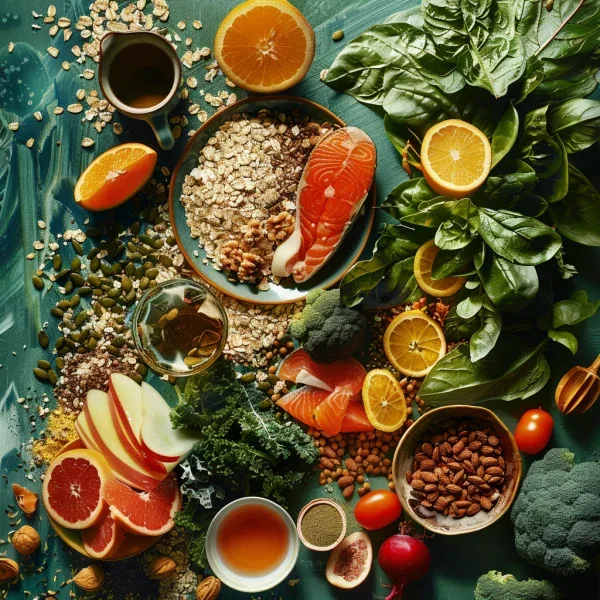by Nadia Sinclair

We’ve all heard the saying, “you are what you eat,” but have you ever thought about your food from the perspective of your mood? Recent findings suggest that not just what we eat but also when we eat can have significant impacts on our emotional well-being. If you find your days turning into an emotional roller coaster, there might be a dietary solution waiting for you. So, let’s dive in, shall we?
Kick-start Your Day the Right Way
Research advocates for having a hearty breakfast soon after waking to help balance our blood sugar and hormone levels, which in turn set the tone for the day, providing us with vitality and mental focus. Kickstarting the day with protein-rich foods such as eggs, full-fat yoghurt with fresh fruits, or a bowl of oats topped with nuts and seeds can work wonders.
For those constant on-the-go or those who might find heavier breakfasts a bit too much to handle, nutritionally balanced meal-replacement drinks made from natural and organic ingredients could be an excellent alternative. The bottom line? Starting your day with a well-rounded meal can help set a positive tone for your entire day, encouraging you to maintain healthy habits.
Choose Your Carbs Wisely
Opting for complex carbohydrates like sweet potatoes, porridge oats, and whole grains for meals can considerably impact your energy levels. These carb-sources are processed more slowly than refined carbohydrates like white bread, meaning they’ll provide a steady energy flow and eliminate the classic high and crash patterns.
To add to the benefits, these complex carbohydrates stimulate a bodily response that leads to serotonin production, the blissful brain chemical, emitting a soothing effect roughly 30 minutes post-meal.
A Mood-Boosting Nutrient: Tryptophan
If your mood tends to shift towards the lower end of the spectrum or if anxiety often creeps up on you, incorporating more tryptophan-rich foods into your diet can be helpful. This nutrient is known for its ability to manufacture serotonin, often referred to as the ‘happy hormone’. Foods high in tryptophan include chicken, turkey, eggs, salmon, tuna, beans, lentils, dark green leafy vegetables, nuts, seeds and even chocolate! Yes, this beloved treat also hosts theobromine, known to enhance mood and promote muscle relaxation.
Stay Hydrated and Feel Better
Although it may not seem apparent, consuming adequate amounts of water is crucial for maintaining a balanced mood. Dehydration can lead to feelings of irritability and short temper. So, ensure to keep a bottle of water nearby and achieve a daily intake goal of about 2.5 litres.
Taming Your Caffeine Consumptions
A morning without coffee may sound unbearable to many of us, but consuming caffeine later in the day can result in a restless night or feelings of anxiety. If you tend to be sensitive to caffeine, consider switching to a herbal infusion after 4 pm. Calming teas such as chamomile, bergamot, and lemon balm can help keep your mood stable. Additionally, a milky drink or lavender infusion before bed can act as a great sleep inducer, reminding us of our childhood wind-down routine.
complex carbohydrates, breakfast, blood sugar, hydration, herbal tea, foods high in tryptophan, serotonin, protein, balanced diet, meal replacement drinks, caffeine, mood enhancement, nutrition
Leave a Reply